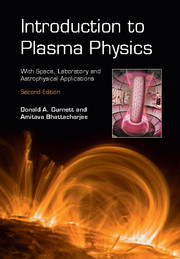Book contents
- Frontmatter
- Dedication
- Contents
- Preface
- 1 Introduction
- 2 Characteristic Parameters of a Plasma
- 3 Single-Particle Motions
- 4 Waves in a Cold Plasma
- 5 Kinetic Theory and the Moment Equations
- 6 Magnetohydrodynamics
- 7 MHD Equilibria and Stability
- 8 Discontinuities and Shock Waves
- 9 Electrostatic Waves in a Hot Unmagnetized Plasma
- 10 Waves in a Hot Magnetized Plasma
- 11 Nonlinear Effects
- 12 Collisional Processes
- Appendix A Symbols
- Appendix B Useful Trigonometric Identities
- Appendix C Vector Differential Operators
- Appendix D Vector Calculus Identities
- Index
- References
12 - Collisional Processes
Published online by Cambridge University Press: 16 March 2017
- Frontmatter
- Dedication
- Contents
- Preface
- 1 Introduction
- 2 Characteristic Parameters of a Plasma
- 3 Single-Particle Motions
- 4 Waves in a Cold Plasma
- 5 Kinetic Theory and the Moment Equations
- 6 Magnetohydrodynamics
- 7 MHD Equilibria and Stability
- 8 Discontinuities and Shock Waves
- 9 Electrostatic Waves in a Hot Unmagnetized Plasma
- 10 Waves in a Hot Magnetized Plasma
- 11 Nonlinear Effects
- 12 Collisional Processes
- Appendix A Symbols
- Appendix B Useful Trigonometric Identities
- Appendix C Vector Differential Operators
- Appendix D Vector Calculus Identities
- Index
- References
Summary
- Type
- Chapter
- Information
- Introduction to Plasma PhysicsWith Space, Laboratory and Astrophysical Applications, pp. 479 - 499Publisher: Cambridge University PressPrint publication year: 2017



